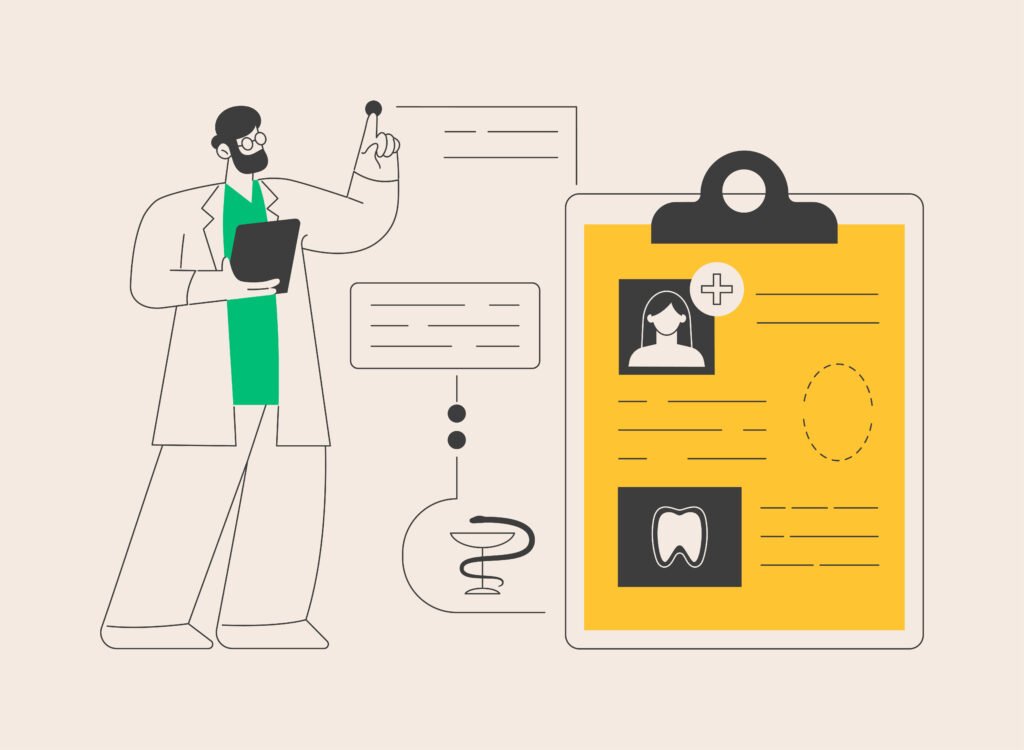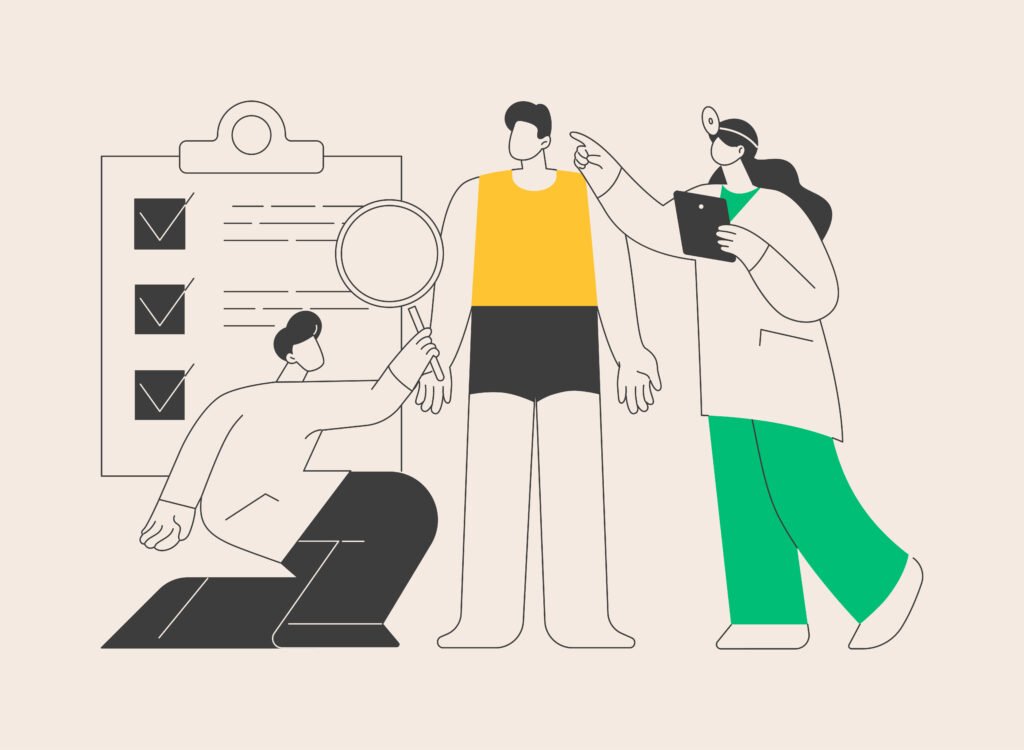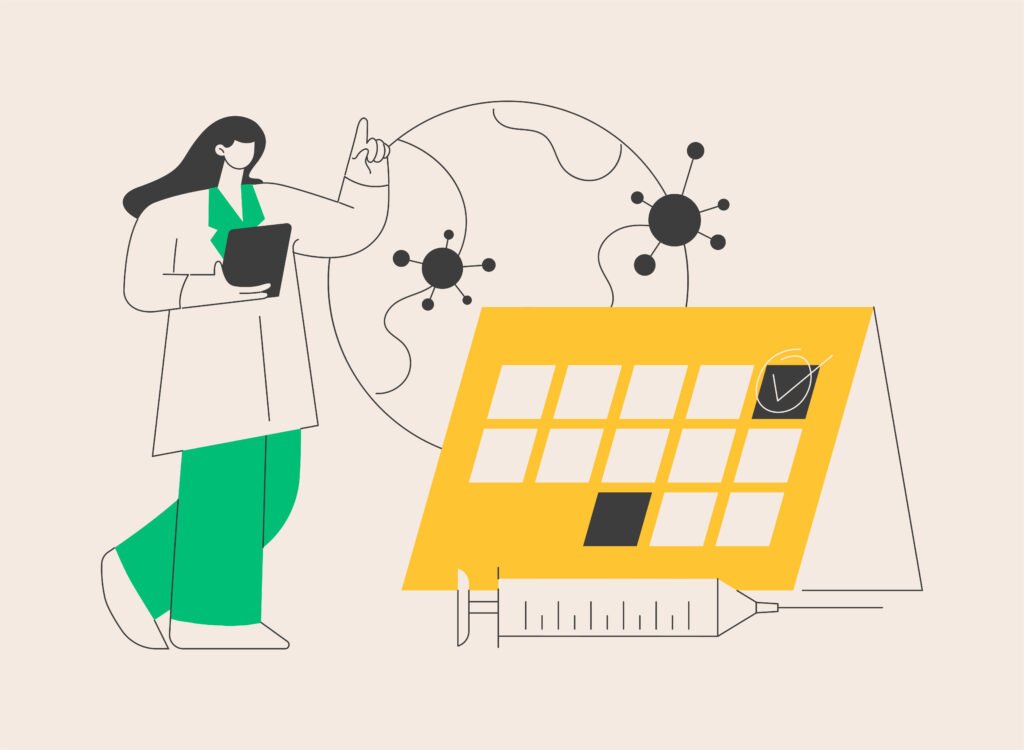- What is the Role of Business Intelligence in Healthcare Industry?
- Predictive Analytics for Disease Management
- Optimizing Healthcare Operations
- Challenges of Implementing Business Intelligence in Healthcare IT
- Future of Business Intelligence in Healthcare Industry
- Conclusion: BI as a Healthcare Catalyst
Business Intelligence in Healthcare: Ways It Enhances Patient Care
14 Nov 2023
Igor Kelly

The COVID-19 pandemic has underscored the critical need for the healthcare industry to swiftly adapt to emerging challenges, whether new virus variants or supply chain disruptions. Conventional healthcare approaches have proven ill-equipped to keep pace with these rapidly evolving threats.
Therefore, the healthcare sector’s demand for business intelligence (BI) technologies has surged. BI empowers many healthcare stakeholders to harness the extensive data from drug trials, medical facilities, electronic health records, and supply chains. This data-driven approach not only enhances our understanding of overarching and minute trends but also enables proactive measures, including predictive insights, to preempt issues effectively.
In this article, we will discuss the benefits of business intelligence in healthcare and how it helps to:
- Generate actionable insights from the largest and most complex healthcare data sets like invoices, medical records, and financial reports – in hours instead of months.
- Address emergency challenges and use hospital resources efficiently by quickly understanding the situation with insights to make data-driven decisions.
- Offer an individual therapeutic approach, especially for high-risk patients, with advanced analyses and comprehensive data visualization.
What is the Role of Business Intelligence in Healthcare Industry?
Business intelligence refers to the technology-driven process of collecting, analyzing, and presenting data to help businesses make informed decisions. It involves transforming raw data into meaningful insights that can guide strategic and operational choices.
In the healthcare industry, BI is a powerful tool for healthcare organizations to improve patient care, operational efficiency, and decision-making.
Considering the growing demand for digitization, business Intelligence applications can help healthcare organizations democratize data, making it accessible for all employees regardless of their tech level, make data-driven decisions on the go, improving patient care and accelerating operations.
Business intelligence and analytics in healthcare involve collecting and converting raw data into valuable, meaningful information. It uses data analysis, statistics, and models to provide insights and make informed decisions. Here are examples of business intelligence in healthcare:
1. Clinical analytics
Clinical analytics involves analyzing patient data to improve patient care and the accuracy of outcomes. It includes monitoring patient records, treatment effectiveness, and clinical decision support systems. After implementing a new treatment protocol, clinicians at the hospital use clinical analytics to track patient outcomes and make real-time adjustments to enhance patient care using the data.
2. Healthcare financial analytics
Financial analytics in healthcare involves managing an organization’s budgets, revenue, and costs. It helps healthcare organizations optimize financial performance, reduce waste, and ensure compliance with regulations. For example, a healthcare provider who adopted financial analytics to identify cost-saving opportunities experienced a 10% reduction in operational costs without compromising patient care quality.
3. Patient experience and satisfaction
Analyzing patient feedback and experiences to improve the quality of care and patient satisfaction are essential healthcare KPIs. EHR (Electronic Health Records) analytics may utilize survey results, social media sentiment analysis, and patient reviews for healthcare performance metrics improvement. One healthcare provider adopted patient satisfaction analytics to identify areas for improvement. The BI tool detected several issues, including prolonged appointment waiting times and difficulties scheduling follow-up care. By employing EHR analytics, including survey data and social media sentiment analysis, they delivered more responsive and patient-centric care.
4. Supply chain and inventory management
Healthcare providers can use BI to optimize the supply chain, manage inventory, and reduce waste in healthcare settings. Real-time healthcare analytics of stocks are crucial for ensuring medical supplies are available when needed. For instance, a major urban hospital sought to enhance its supply chain management. By implementing real-time healthcare analytics, they gained greater visibility into inventory levels and expiration dates of medical supplies. This data-driven approach allowed the hospital to reduce waste, streamline procurement, and ensure essential supplies were consistently available.
Predictive Analytics for Disease Management
Leading healthcare suppliers aim to digitize population health management as they seek greater automation across the entire supply chain. To do that, they adopt predictive analytics, which utilizes historical and current data, statistical algorithms, and ML techniques to forecast future trends, outcomes, or events.
By combining value-based care with predictive analytics, suppliers work efficiently and with such commitment that they sustainably strengthen their customer relationships. In the context of business intelligence in healthcare, predictive analytics encompasses several essential types, including:
- Patient readmission prediction: predicting which patients are at a higher risk of hospital readmission allows healthcare providers to take proactive measures to reduce readmission rates.
- Resource demand forecasting: predicting the demand for medical resources such as beds, ventilators, or medications, helping healthcare facilities allocate resources efficiently.
- Treatment response prediction: providing of how patients may respond to specific treatments or medications, enabling personalized care plans.
- Chronic disease progression modeling: predicting the progression of chronic diseases, such as diabetes or heart disease, to enhance disease management and early intervention strategies.
Business intelligence in healthcare delivers a flood of data that has enormous potential. Here are a few examples of how healthcare data visualization makes a difference.
- In the Dutch region of Noord-Holland, a group of cardiologists and the local medical service aimed to reduce mortality rates. Also, they strived to improve post-heart attack patient outcomes by shortening the time between reporting a heart attack and angioplasty. They analyzed all processes, from reporting emergencies by telephone to hospital treatment, using a dedicated dashboard. The data analysis optimized emergency patient distribution, considering waiting and travel times. Healthcare data integration reduced the call-to-operation time by an average of 20 minutes, down to two hours – a significant improvement in a time-critical condition.
- Another example is how a large healthcare system utilized clinical data analysis to identify those at high risk for diabetes-related complications. The system stratified patients into risk categories by leveraging historical patient records and factors such as HbA1c levels, medication adherence, age, and comorbid conditions. High-risk patients received tailored interventions, including regular follow-up appointments, medication adjustments, and remote monitoring through mobile apps. Medical records analysis improved glycemic control, reduced hospitalizations, and improved patient outcomes, ultimately enhancing the quality of diabetes treatment.
- It is also worth taking a look at Sweden, one of the largest hospitals in Northern Europe. Thanks to new healthcare decision support, the Sahlgrenska University Hospital saved millions every year — this is an impressive sum even for a large hospital with around 2,700 beds and 17,000 employees.
Despite such representative examples of business intelligence in healthcare, for all stakeholders to benefit from data, data must be understood and used in ways that lead to better patient outcomes. Predictions based on reliable data can help suppliers and their customers make critical business decisions that positively impact disease management and patient care. Business intelligence services have become essential for processing predictive healthcare insights and utilizing their results for patient outcome improvement.

Optimizing Healthcare Operations
Data-driven insights derived by BI in healthcare can reveal where inequalities persist. How does BI optimize healthcare data quality? Here are three examples based on daily hospital operations:
- Bed utilization. BI tools dynamically analyze healthcare reporting and monitor the occupancy of hospital beds in real time. When the occupancy reaches a predefined threshold, the system automatically alerts the hospital staff, enabling them to optimize bed allocation, reduce patient waiting times, and ensure timely admissions.
- Medication inventory. BI systems track medication inventory levels, and when certain medications are running low, they generate automatic reorder alerts to pharmacy staff. Pharmaceutical analytics prevents medication shortages, ensuring patients receive the necessary treatments without interruption.
- Operating room scheduling. BI tools analyze surgery schedules and historical data to identify underutilized operating room time slots. When available time is detected, the system generates alerts to the scheduling team, allowing them to maximize the efficiency of the operating rooms by accommodating additional surgeries and reducing patient wait times.
Leveraging data to make daily hospital processes more efficient and improve patient care is closely aligned with the benefits of full cycle software development, which is instrumental in optimizing healthcare operations. Lightpoint has extensive experience creating tailored, end-to-end software solutions that streamline processes, enhance data management, and ultimately lead to greater healthcare ROI.
Challenges of Implementing Business Intelligence in Healthcare IT
Healthcare generates vast and diverse datasets, including electronic health records (EHRs), medical imaging, clinical notes, insurance claims, and more. Such a variety of data types hampers the implementation of BI in healthcare can be challenging due to other specific complexities of the industry. Here are four common issues:
- Data integration and quality. Healthcare organizations deal with vast amounts of data from various sources, including electronic health records (EHRs), billing systems, and more. Ensuring the integration and quality of this data is a significant challenge. Inconsistent data formats and quality issues can lead to inaccurate insights and decisions.
- Privacy and security. Healthcare data such as clinical research analytics contains sensitive patient information that must be protected according to strict regulations (e.g., HIPAA in the United States). Ensuring healthcare data security while still making data accessible for BI analysis is a delicate balance. Implementing robust security measures and complying with data protection laws is a challenge.
- Interoperability. Healthcare systems often use different technologies and standards, making it difficult for BI tools to work seamlessly across various platforms. A lack of interoperability may result in fragmented data and, therefore, missed insights. Enabling a smooth data exchange between systems is a significant challenge.
- Cultural change management. Implementing healthcare BI solutions may face resistance from professionals who are accustomed to traditional practices. Training staff to use BI tools effectively can be challenging and may result in slower adoption of BI tools, potentially impeding the efficient use of resources.
To address these challenges, healthcare organizations must invest in robust data integration solutions to ensure strict data governance and security protocols. Working towards interoperability standards and providing comprehensive training and support to staff will help foster a data-driven healthcare culture.
Custom healthcare software development solutions can be a powerful support for healthcare providers. By aligning technology with ethical guidelines and ensuring robust data encryption, organizations can confidently leverage the benefits of data-driven healthcare decision-making while upholding the ethical standards and privacy expectations of both patients and the industry.

Future of Business Intelligence in Healthcare Industry
There are many new technologies in the business intelligence ecosystem. With their market launch, gaps that still need to be filled become visible. As BI in healthcare is poised to advance in various directions, let’s explore a few key destinations for BI development in healthcare.
1. Predictive analytics for early disease detection
As discussed above, BI can analyze electronic health records to identify patterns and predict the likelihood of diseases like diabetes, cancer, or heart conditions. However, the potential for early intervention and preventive measures is incredibly huge:
- Patient engagement: predictive analytics can enhance personal participation by using historical data to anticipate medication adherence issues. For instance, if a patient with a chronic condition frequently misses medication doses, telehealth analytics can alert the healthcare team, enabling them to reach out to the patient with support, reminders, or alternative treatment options, ultimately improving patient engagement in their treatment plan.
- Assets allocation: predictive analytics assists healthcare providers in addressing the total cost of care by analyzing patient data and identifying high-risk individuals who may require more intensive and costly interventions. This early intervention improves patient outcomes and helps control costs by reducing hospital readmissions and preventing the escalation of chronic conditions, ultimately leading to more cost-effective healthcare delivery.
2. AI and machine learning for treatment and diagnosis
AI allows doctors to recognize and make findings and decisions for therapy more quickly. This gives those affected more rapid certainty and the opportunity for treatment. In addition, many research projects have been started in industry and the academic world for further use cases in the following areas:
- Radiology and diagnostics: BI-driven AI can assist radiologists in interpreting medical images, potentially improving diagnostic accuracy and efficiency. For example, radiologists identify subtle abnormalities in mammograms, increasing the early detection of breast cancer.
- Drug discovery and development: healthcare machine learning algorithms accelerate drug discovery by analyzing vast datasets to identify potential drug candidates and assess their effectiveness in data-driven clinical trials.
Patient-centric BI solutions will also help to determine which supplies are most effective for a particular patient group and how they can be delivered cost-effectively. The result is not only better patient care but also improved operational efficiency. As we look to the future of healthcare BI, it’s clear that data-driven insights will play an increasingly pivotal role in shaping healthcare strategies and improving overall patient outcomes.
Conclusion: BI as a Healthcare Catalyst
In a highly competitive business landscape, healthcare analytics adoption can become a competitive edge for healthcare providers as it helps to identify market trends, patient preferences, and areas for improvement. By staying ahead of the curve, healthcare organizations can attract more patients and remain financially sustainable.
Healthcare BI trends will focus on solutions adhering to the following standards:
- Measurable data quality
- Scalable to all clinic sizes
- All data is available daily and granular (uncondensed).
- Automatic adoption of hierarchies from source systems
- Information advantage through mobile availability of reports and analyses
- Shortening decision-making processes through real-time reporting
- Modular introduction and application concepts
To explore how your business can benefit from healthcare BI solutions, schedule a consultation with a Lightpoint expert.


